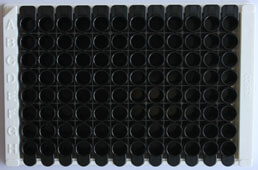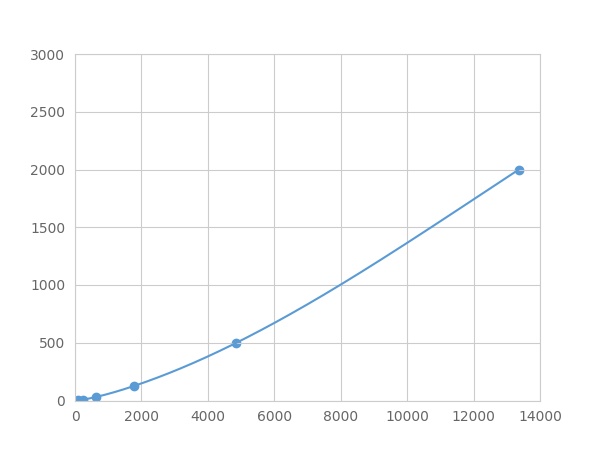Packages (Simulation)

Reagent Preparation

Image (I)
Image (II)
Certificate


Multiplex Assay Kit for Procollagen II C-Terminal Propeptide (PIICP) ,etc. by FLIA (Flow Luminescence Immunoassay)
P2CP; C-Propeptide Of Type II Procollagen; Procollagen II Carboxy Terminal Propeptide
(Note: Up to 8-plex in one testing reaction)
- Product No.LMA964Hu
- Organism SpeciesHomo sapiens (Human) Same name, Different species.
- Sample Typeserum, plasma and other biological fluids
- Test MethodDouble-antibody Sandwich
- Assay Length3.5h
- Detection Range1.95-2000pg/mL
- SensitivityThe minimum detectable dose of this kit is typically less than 0.65 pg/mL.
- DownloadInstruction Manual
- UOM 8Plex 7Plex 6Plex 5Plex 4Plex 3Plex 2Plex1Plex
- FOB
US$ 424
US$ 441
US$ 465
US$ 498
US$ 530
US$ 579
US$ 653
US$ 816
Add to Price Calculator
Result
For more details, please contact local distributors!
Specificity
This assay has high sensitivity and excellent specificity for detection of Procollagen II C-Terminal Propeptide (PIICP) ,etc. by FLIA (Flow Luminescence Immunoassay).
No significant cross-reactivity or interference between Procollagen II C-Terminal Propeptide (PIICP) ,etc. by FLIA (Flow Luminescence Immunoassay) and analogues was observed.
Recovery
Matrices listed below were spiked with certain level of recombinant Procollagen II C-Terminal Propeptide (PIICP) ,etc. by FLIA (Flow Luminescence Immunoassay) and the recovery rates were calculated by comparing the measured value to the expected amount of Procollagen II C-Terminal Propeptide (PIICP) ,etc. by FLIA (Flow Luminescence Immunoassay) in samples.
| Matrix | Recovery range (%) | Average(%) |
| serum(n=5) | 87-101 | 93 |
| EDTA plasma(n=5) | 99-105 | 102 |
| heparin plasma(n=5) | 84-98 | 95 |
Precision
Intra-assay Precision (Precision within an assay): 3 samples with low, middle and high level Procollagen II C-Terminal Propeptide (PIICP) ,etc. by FLIA (Flow Luminescence Immunoassay) were tested 20 times on one plate, respectively.
Inter-assay Precision (Precision between assays): 3 samples with low, middle and high level Procollagen II C-Terminal Propeptide (PIICP) ,etc. by FLIA (Flow Luminescence Immunoassay) were tested on 3 different plates, 8 replicates in each plate.
CV(%) = SD/meanX100
Intra-Assay: CV<10%
Inter-Assay: CV<12%
Linearity
The linearity of the kit was assayed by testing samples spiked with appropriate concentration of Procollagen II C-Terminal Propeptide (PIICP) ,etc. by FLIA (Flow Luminescence Immunoassay) and their serial dilutions. The results were demonstrated by the percentage of calculated concentration to the expected.
| Sample | 1:2 | 1:4 | 1:8 | 1:16 |
| serum(n=5) | 83-101% | 79-90% | 81-98% | 99-105% |
| EDTA plasma(n=5) | 83-96% | 85-101% | 80-91% | 94-102% |
| heparin plasma(n=5) | 96-105% | 98-105% | 88-98% | 95-102% |
Stability
The stability of kit is determined by the loss rate of activity. The loss rate of this kit is less than 5% within the expiration date under appropriate storage condition.
To minimize extra influence on the performance, operation procedures and lab conditions, especially room temperature, air humidity, incubator temperature should be strictly controlled. It is also strongly suggested that the whole assay is performed by the same operator from the beginning to the end.
Reagents and materials provided
| Reagents | Quantity | Reagents | Quantity |
| 96-well plate | 1 | Plate sealer for 96 wells | 4 |
| Pre-Mixed Standard | 2 | Standard Diluent | 1×20mL |
| Pre-Mixed Magnetic beads (22#:PIICP) | 1 | Analysis buffer | 1×20mL |
| Pre-Mixed Detection Reagent A | 1×120μL | Assay Diluent A | 1×12mL |
| Detection Reagent B (PE-SA) | 1×120μL | Assay Diluent B | 1×12mL |
| Sheath Fluid | 1×10mL | Wash Buffer (30 × concentrate) | 1×20mL |
| Instruction manual | 1 |
Assay procedure summary
1. Preparation of standards, reagents and samples before the experiment;
2. Add 100μL standard or sample to each well,
add 10μL magnetic beads, and incubate 90min at 37°C on shaker;
3. Remove liquid on magnetic frame, add 100μL prepared Detection Reagent A. Incubate 60min at 37°C on shaker;
4. Wash plate on magnetic frame for three times;
5. Add 100μL prepared Detection Reagent B, and incubate 30 min at 37°C on shaker;
6. Wash plate on magnetic frame for three times;
7. Add 100μL sheath solution, swirl for 2 minutes, read on the machine.
GIVEAWAYS
INCREMENT SERVICES
| Magazine | Citations |
| Experimental and Therapeutic Medicine | Evaluation of the effect of N-acetyl-glucosamine administration on biomarkers for cartilage metabolism in healthy individuals without symptoms of arthritis: A … 10.3892 |
| Functional Foods in Health & Disease | Evaluation of the effect of administering N-acetyl-glucosamine-containing green tea supplement on biomarkers for cartilage metabolism in healthy individuals without symptoms of arthritis: a randomized double-blind placebo-controlled clinical study 309 |
| EXPERIMENTAL AND THERAPEUTIC MEDICINE | Effect of N-acetylglucosamine administration on cartilage metabolism and safety in healthy subjects without symptoms of arthritis: A case report pubmed:28413518 |
| Experimental and Therapeutic Medicine | Evaluation of the effect of salmon nasal proteoglycan on biomarkers for cartilage metabolism in individuals with knee joint discomfort: A randomized double‑blind placebo‑controlled clinical study etm:14 |
| Experimental and Therapeutic Medicine | Evaluation of the efficacy of Ajuga decumbens extract supplement in individuals with knee discomfort associated with physical activity: A randomized, double‑blind, placebo‑controlled study 10.3892/etm.2017.5064 |
| EXPERIMENTAL AND THERAPEUTIC MEDICINE | Evaluation of the chondroprotective action of N‑acetylglucosamine in a rat experimental osteoarthritis pubmed:28912864 |
| Functional Foods In Health And Disease | Evaluation of the effect of N-acetyl-glucosamine administration on biomarkers for cartilage metabolism in healthy individuals: a randomized double-blind placebo-controlled clinical study view/366 |
| Spine | No effects of hyperosmolar culture medium on tissue regeneration by human degenerated nucleus pulposus cells despite upregulation extracellular matrix genes fulltext:2018/03010 |
| Advances in Clinical and Experimental Medicine | Fibulin-3 and other cartilage metabolism biomarkers in relationship to calprotectin (MRP8/14) and disease activity in rheumatoid arthritis patients treated with … 68362.pdf |
| Functional Food Research | サケ鼻軟骨由来プロテオグリカン摂取による関節保護効果 |
| Spine | No Effects of Hyperosmolar Culture Medium on Tissue Regeneration by Human Degenerated Pubmed: 25856264 |
| Applied Physiology Nutrition and Metabolism | Effectiveness of collagen supplementation on pain scores in healthy individuals with self-reported knee pain; A randomized controlled trial Pubmed: 31990581 |
| International Journal of Molecular Sciences | Bone Morphogenetic Proteins for Nucleus Pulposus Regeneration Pubmed: 32295299 |
| Biomolecules | Concerted Actions by PIICP, CTXII, and TNF-¦Á in Patients with Juvenile Idiopathic Arthritis 33924892 |




